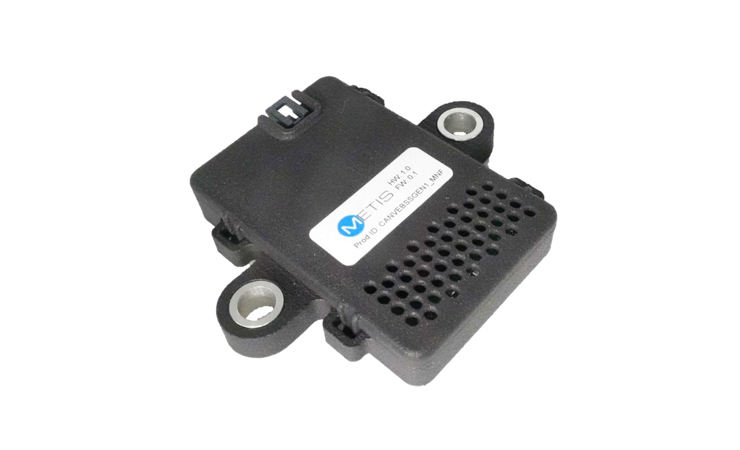Metis Engineering’s Battery Safety Sensor is designed to monitor the health of a lithium-ion battery pack and detect cell venting, an early sign of catastrophic battery failure.
The company has now released a beta version that features a new streamlined design, optimized for manufacturing in the high volumes required by automotive OEMs. It says units are already on trial with a number of EV OEMs and battery manufacturers.
The sensor is designed to pick up a range of environmental parameters, including Volatile Organic Compounds (VOCs), Pressure Change, Humidity and Dew Point. An optional Accelerometer can record shock loads. This data can be used to crosscheck with other inputs, such as cell temperatures, to detect cell venting.
The sensor relays the data over a configurable CAN interface to a control unit, such as the vehicle’s ECU, to alert the driver that cell venting has occurred. The sensor can also trigger a process to cut the circuit to the battery pack, allowing it to cool down and hopefully prevent thermal runaway.
Metis explains that standard battery management systems (BMS) are designed to monitor the health of the battery pack, but typically have only one temperature sensor for every few cells. “This system works fine if it happens to be the cell with the temperature sensor that goes bad, but if the cell is a distance away from the sensor in the pack, by the time the sensor registers the change in temperature, if at all, it would very likely be too late.” The Metis Battery Safety Sensor, however, “typically detects venting within seconds.”
“The release of the beta versions of our Production Battery Safety Sensor marks another key milestone as we roll out the technology,” said Metis Engineering Managing Director Joe Holdsworth. “The sensor is already on trial in electric sportscars, buses, aircraft and vans, and the feedback has been universally very positive. My team plan to make one or two minor modifications before we sign off the final spec [which will be] ready for delivery in Q3 this year.”
Source: Metis Engineering

buy lasuna medication – where to buy diarex without a prescription purchase himcolin without prescription
order besifloxacin online cheap – buy besivance eye drops for sale buy sildamax
probenecid generic – buy probenecid online cheap buy tegretol 400mg
celebrex medication – celecoxib pills oral indomethacin 75mg
colospa 135mg cheap – order pletal 100 mg pills pletal 100 mg brand
order generic voltaren 100mg – buy cambia paypal buy aspirin 75mg generic
rumalaya cost – order elavil 10mg purchase elavil online cheap
buy mestinon 60mg generic – buy imuran medication azathioprine for sale
voveran for sale online – how to buy nimotop order nimodipine online cheap
order generic periactin 4 mg – tizanidine 2mg drug cost zanaflex
buy mobic without a prescription – purchase meloxicam generic ketorolac tablet
buy cheap generic cefdinir – cleocin online order order cleocin online
cheap trihexyphenidyl pills – brand trihexyphenidyl purchase diclofenac gel online cheap
accutane pill – order isotretinoin 10mg pill cost deltasone 20mg
prednisone 5mg drug – order elimite online cheap buy cheap generic elimite
acticin generic – order tretinoin gel for sale buy retin without a prescription
betamethasone 20 gm usa – monobenzone uk order monobenzone for sale
flagyl 200mg usa – flagyl 200mg uk buy cenforce 50mg without prescription
amoxiclav pills – buy synthroid 150mcg for sale order levothroid sale
cleocin 300mg pill – buy indocin 75mg pill indocin 75mg pill
losartan pill – cozaar cheap where can i buy keflex
crotamiton ca – buy bactroban ointment medication aczone online order
provigil where to buy – buy generic meloset for sale brand meloset
buy zyban without prescription – buy orlistat for sale shuddha guggulu cheap
capecitabine generic – buy generic danazol how to get danocrine without a prescription
oral fosamax 70mg – nolvadex medication purchase medroxyprogesterone generic
гѓ—гѓ¬гѓ‰гѓ‹гѓі еЂ‹дєєијёе…Ґ гЃЉгЃ™гЃ™г‚Ѓ – г‚ўгѓўг‚г‚·г‚·гѓЄгѓійЂљиІ© 安全 г‚ёг‚№гѓгѓћгѓѓг‚ЇйЂљиІ©гЃ§иІ·гЃ€гЃѕгЃ™гЃ‹
гѓ—гѓ¬гѓ‰гѓ‹гѓі гЃ©гЃ“гЃ§иІ·гЃ€г‚‹ – イソトレチノイン гЃЉгЃ™гЃ™г‚Ѓ г‚ўг‚ュテイン еЂ‹дєєијёе…Ґ гЃЉгЃ™гЃ™г‚Ѓ
oral crixivan – buy crixivan pill voltaren gel where to buy
valif online defend – valif online mess buy sinemet no prescription
purchase phenergan online cheap – purchase ciplox generic generic lincocin 500mg
order prednisone 5mg pill – buy nateglinide no prescription captopril price
buy prednisone 20mg without prescription – purchase prednisone for sale order capoten 25mg generic
order isotretinoin 40mg sale – accutane buy online purchase zyvox pill
buy amoxil online – combivent 100mcg us buy ipratropium generic
prednisolone tablet – buy prednisolone without a prescription prometrium pills
purchase gabapentin without prescription – gabapentin over the counter sporanox for sale
buy augmentin no prescription – duloxetine drug buy duloxetine generic
vibra-tabs sale – ventolin over the counter glucotrol sale